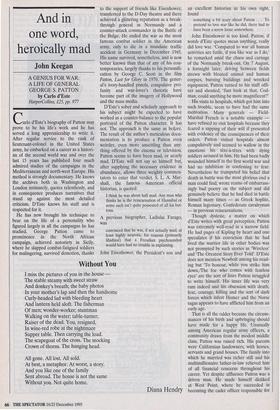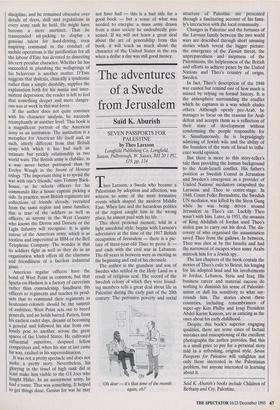And in one word, heroically mad
John Keegan
A GENIUS FOR WAR: A LIFE OF GENERAL GEORGE S. PATTON by Carlo d'Este HarperCollins, £25, pp. 977 Carlo d'Este's biography of Patton may prove to be his life's work and he has served a long apprenticeship to write it. After regular service to the rank of lieutenant-colonel in the United States army, he embarked on a career as a histori- an of the second world war and over the last 15 years has published four much admired studies of the campaigns in the Mediterranean and north-west Europe. His method is strongly documentary. He knows the archives both in Washington and London intimately, quotes relentlessly, and in consequence produces narratives that stand up against the most detailed criticism. D'Este knows his stuff and is respected for it.
He has now brought his technique to bear on the life of a personality who figured largely in all the campaigns he has studied. George Patton came to prominence in the North African campaign, achieved notoriety in Sicily, where he slapped combat-fatigued soldiers for malingering, survived demotion, thanks to the support of friends like Eisenhower, transferred to the D-Day theatre and there achieved a glittering reputation as a break- through general in Normandy and a counter-attack commander in the Battle of the Bulge. He ended the war as the most famous combat soldier in the American army, only to die in a mundane traffic accident in Germany in December 1945. His name survived, nonetheless, and is now better known than that of any of his con- temporaries, largely thanks to his personifi- cation by George C. Scott in the film Patton, Lust for Glory in 1970. The gener- al's ivory-handled pistols, compulsive pro- fanity and war-lover's rhetoric have become part of the imagery of Hollywood and the mass media.
D'Este's sober and scholarly approach to his subject might be expected to have worked as a counter-balance to the popular portrayal of the Patton character. It has not. The approach is the same as befpre. The result of the author's meticulous docu- mentation is to produce a Patton even weirder, even more unsettling than any- thing offered by the cinema or television. Patton seems to have been mad, or nearly mad. D'Este will not say so himself but, after supplying the necessary evidence in abundance, allows three weighty commen- tators to enter that verdict. S. L. A. Mar- shall, the famous American official historian, is quoted: I think he was about half mad, Any man who thinks he is the reincarnation of Hannibal or some such isn't quite possessed of all his but- tons.
A previous biographer, Ladislas Farago, was
convinced that he was, if not actually mad, at least highly neurotic, for reasons (primarily libidinal) that a Freudian psychoanalyst would have had no trouble in explaining.
John Eisenhower, the President's son and an excellent historian in his own right, found
something a bit scary about Patton ... To pretend to love war like he did, there had to have been a screw loose somewhere.
John Eisenhower is too kind. Patton, if words d'Este quotes mean anything, really did love war. 'Compared to war all human activities are futile, if you like war as I do,' he remarked amid the chaos and carnage of the Normandy break-out. On 7 August, a fortnight later, driving between fields strewn with bloated animal and human corpses, burning buildings and wrecked equipment, Patton turned to his staff offi- cer and shouted, 'Just look at that, Cod- man, could anything be more magnificent?'
His visits to hospitals, which got him into such trouble, seem to have had the same motivation. Many generals — Field- Marshal French is a notable example have refused to visit hospitals because they feared a sapping of their will if presented with evidence of the consequences of their orders. Patton visited hospitals almost compulsively and seemed to wallow in the emotions his tete-A-fetes with dying soldiers aroused in him. He had been badly wounded himself in the first world war and had no inhibition in confessing to fear. Nevertheless he trumpeted his belief that death in battle was the most glorious end a man could find, wrote reams of embarrass- ingly bad poetry on the subject and did genuinely believe that he had died in battle himself many times — as Greek hoplite, Roman legionary, Confederate cavalryman — in previous reincarnations.
Though dyslexic, a matter on which d'Este writes with great perception, Patton was extremely well-read in a narrow field. He had pages of Kipling by heart and one speculates if his conviction that he had lived the warrior life in other bodies was not prompted by such stories as 'Wireless' and 'The Greatest Story Ever Told'. D'Este does not mention Newbolt among his read- ing but 'To honour, while you strike him down,/The foe who comes with fearless eyes' are the sort of lines Patton struggled to write himself. His inner life was very rum indeed and his obsession with death, fear, courage, killing and the sort of dark forces which infest Homer and the Norse sagas appears to have afflicted him from an early age.
That is all the odder because the circum- stances of his birth and upbringing should have made for a happy life. Unusually among American regular army officers, a community drawn from the modest middle class, Patton was raised rich. His parents were Californian landowners, with horses, servants and grand houses. The family into which he married was richer still and his multimillionaire father-in-law relieved him of all financial concerns throughout his career. Yet despite affluence Patton was a driven man. He made himself disliked at West Point, where he succeeded in becoming the cadet officer responsible for discipline, and he remained obsessive over details of dress, drill and regulations in every army rank he held. He might have become a mere martinet. That he transcended nit-picking to display a genuine talent for hard-driving, even inspiring command in the conduct of mobile operations is the justification for all the labour d'Estc has devoted to dissecting his very peculiar character. Whether he has succeeded in plumbing the wellsprings of his behaviour is another matter. D'Este suggests that dyslexia, clinically a syndrome rather than a simple disability, supplies the explanation both for his mania and inter- mittent depression; the reader is left to feel that something deeper and more danger- ous was at work in this war-lover.
If the author does not quite convince with his character analysis, he succeeds triumphantly at another level. This book is a magnificent portrait of the American army as an institution. The institution is a metaphor for American life itself and, as such, utterly different from that British army with which it has had such an intimate but prickly relationship in two world wars. The British army is clublike, in a way never better portrayed than by Evelyn Waugh in the Sword of Honour trilogy. 'The important thing is to spend the war with one's friends,' says Tommy Back- house, as he selects officers for his commando like a house captain picking a side. In practice, most British regiments are collections of friends already, recruited from the same region and same families; this is true of the soldiers as well as officers, as anyone in the West Country who knows the Devon and Dorsets or the Light Infantry will recognise. It is quite untrue of the American army, which is as rootless and impersonal as IBM or the Bell Telephone Company. The wonder is that its soldiers fight as well as they do in an organisation which offers all the charisma and friendliness of a faceless industrial giant.
American regular officers have the bond of West Point in common; but that Sparta-on-Hudson is a factory of careerism rather than comradeship. Sandhurst fits officers to regiments and teaches its prod- ucts that to command their regiments as lieutenant-colonels should be the summit of ambition. West Point sets out to breed generals, and no holds barred. Patton, from his earliest cadet days, dreamt of becoming a general and followed his star from one lonely post to another across the great spaces of the United States. He cultivated Influential superiors, despised fellow competitors and, when his star at last came his way, exulted in his superordination.
It was not a pretty spectacle and does not make a pretty story. Nevertheless, his glorying in the tinsel of high rank did at least make him visible to the GI Joes who fought Hitler. In an anonymous army, be had a name. That was something. It helped to get things done. Genius for war he may
not have had — this is a bad title for a good book — but a sense of what was needed to energise a mass army drawn from a mass society he undoubtedly pos- sessed. If we will not learn a great deal about the art of generalship from this book, it will teach us much about the character of the United States in the era when a dollar a day was still good money.











































































































 Previous page
Previous page